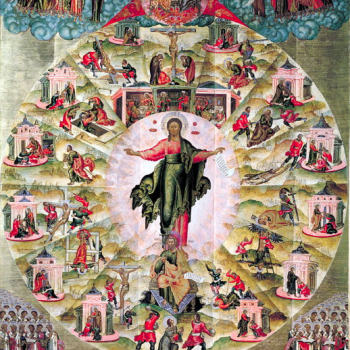"30 Days," a television show about trading places, is grabbing a ratings niche—and deservedly so. The premise takes people whose beliefs and values are in complete opposition and moves them into the daily life of the other side for thirty days. For me, I'd be moving in with Cleveland Browns fans who wear 1950's era cowboy band shirts with fringe over the pockets and eat stewed okra every day. It would be grim. The real shows get more intense than that. A white supremacist moves in with a black family. An atheist moves in with a Baptist family. Much is challenged, and much is learned.
Trading places is an apt description for what author Lee Camp tries to do in his new book Who Is My Enemy? Questions American Christians Must Face About Islam - And Themselves. (Visit the Patheos Book Club for more conversation on this book.) Fielding questions after a talk in Nashville, Camp encountered a woman asking, "[H]ow should we respond to those people... down at the mosque on Twelfth Avenue, all these people who want to kill us?" Camp replied that he thought she was wrong about their intentions. But a lot of people in America agree with her—Muslims conquer by the sword; it's convert or die. Is this true the way many believe it? Camp wants us to trade places, to get inside the head of a faith with which we disagree.
A lot of people who should read Camp's book either won't or will put it down. It's strong stuff, especially when Camp talks not about Muslims, but about us.
Camp opens our eyes to something many Christians have examined—our own wrong and evil as Christians. We've given our critics a lot of ammunition. Even if churches would teach on this, it's doubtful anyone would come. He also examines evil done in and by Christian America. The springboard into all this comes from Paul in Romans 2:1-3, which says, "Do you imagine, whoever you are, that when you judge those who do such things and yet do them yourself, you will escape the judgment of God?" Camp lays out our history starting with the early church and their lives and teaching. He also moves into later church history and American history.
I remember a teacher querying his class, "How many of you understand that when the church does something, that doesn't mean that Christians are doing it?" While he was partially right, sometimes real Christians commit real evil. Sometimes Christian America hasn't been very Christian. (Read Bury My Heart at Wounded Knee by Dee Brown with Kleenex handy.)
Here's where Lee Camp throws his fastball. He writes well documented, riveting prose carrying the reader through the five or six chapters that make up the meat of the book. He disturbs our thinking and makes us look at the painful and even repulsive parts of Christian history. Then, after we engage with our ugly past, Lee introduces us to real Muslims.
Here's where we trade places. We read Muslim historians and meet living Muslims, including scholars, barbers and cab drivers. A local note: the Detroit area (notably Dearborn) holds the greatest concentration of Muslims in the United States. Wayne (a nearby largely white blue collar suburb) elected Abdul Hadous, a Muslim, as their first popularly elected mayor just two months after the 9/11 bombings. He is still the mayor, either running unopposed or winning by wide margins. The citizens say he's the most patriotic man they've ever known.
Camp doesn't advocate everybody putting his or her beliefs in a blender and hitting the "puree" button. He holds that Islam needs to look at its past, too. He says we should learn to disagree agreeably and, in the process, gain a hearing for Jesus Christ. Camp says simply that we should live the Bible we say we believe, especially concerning how Christians should treat those who mistreat or oppose us because of our faith. He has particular Scripture in mind: Romans 12:14, 17, 19-21. Any Christian reading these verses will know how we should regard the Muslims down at the mosque on Twelfth Avenue who want to kill us. It's too good to miss; look it up.
His final point involves acts of genuine kindness extended to those we disagree with without compromise. In the days after 9/11, the Muslim Center at a major university was vandalized. As Muslim students crunched on top of broken glass, they turned to see a group of students approaching and tensed up prepared for the worst. A Christian campus ministry walked up and not only offered to help clean up, but brought food. We should go and do likewise.
This is not the book I thought I would review. I thought this would be more about showing us practical ways how to love those who seem to be our enemy. But Camp's book demonstrates that we obviously have some work to do at home first. And Muslims aren't the only people we list in that category. Homosexuals come to mind. If Christians do not learn how to listen to those who do not embrace our faith, we are going to lose our voice in this culture. We're increasingly seen as nasty, ghettoized people that more people every day can learn to do without.
Maybe Lee Camp has a sequel in mind. On the back cover, Shane Claiborne comments, "Lee Camp knows that Christianity is better than the worst things Christians have done." After reading his book, we will know it, too, in a much deeper way. Then the trick will be to stop adding to the worst and live according to the Book we say we believe.
Read an excerpt from Who Is My Enemy? and a Q&A with author Lee Camp at the Patheos Book Club here.
9/20/2011 4:00:00 AM




